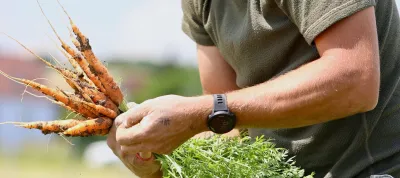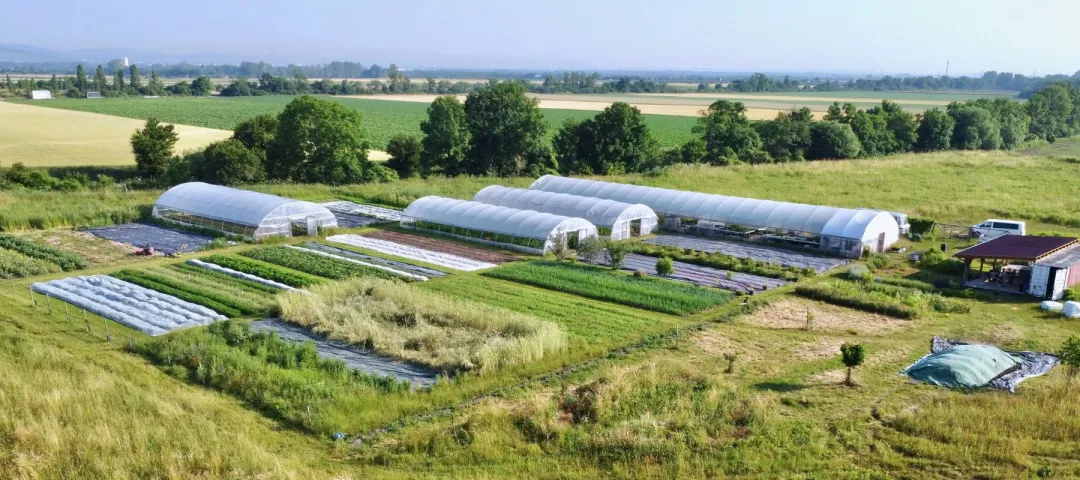General information
RDP Priority
- P2. Competitiveness
- P3. Food chain and risk management
- P4. Ecosystems management
RDP Focus Area
- 2A: Farm’s performance, restructuring & modernisation
- 3A: Agri-food chain integration & quality
- 4C: Soil erosion & soil management
RDP Measure
- M16: Cooperation
Beneficiary type
- Operational group
Summary
The Operational Group (OG) Market Gardening was launched in 2022 and was one of Europe's most recent large-scale projects to scientifically analyse market gardening. This concept involves small-scale, efficient production systems for regional vegetable supplies, rooted in regenerative agriculture principles.
The OG project collected extensive data on plant cultivation, soil science, business, and labour management from participating market gardeners. The overall goals focused on supporting new and existing market gardens to enhance Austria's fresh vegetable supply.
Throughout the project, numerous activities promoted market gardening's potential. A communication campaign (online and through published content) reached large numbers of interested stakeholders.
Results
The project pioneered comprehensive data collection on crop production, business management, and soil to quantify Austria’s market gardening production system.
A communication campaign disseminated the project messages, and key findings showed that:
- 60 different types of vegetables could be produced annually;
- 6 kg of vegetables per square meter can be harvested from open-air areas;
- 14 kg of vegetables per square meter can be harvested in foil tunnels.
Results of the data collection on the project's practical farms and the analyses based on these are transferable to market gardens throughout Austria, as well as to the Central European context if climatic conditions are similar enough.
With nearly 50 000 website hits as of June 2024, the project attracted significant interest.

Promoter
BIO AUSTRIA – Association for the promotion of organic farming*
* The Project promoter/beneficiary is an EIP-AGRI Operational Group ©
Funding
Total budget 434 668 (EUR)
EAFRD: 215 462 (EUR)
National/Regional: 215 463 (EUR)
Private/own: 3 743 (EUR)
Themen
Keywords
Ressourcen
Documents
Context
Austria's vegetable self-sufficiency has been approximately 60%, despite rising consumption. Current vegetable production methods are complex, requiring high investments and emitting significant CO2. Organic farming also involves heavy mechanical weed control, which hinders humus buildup. These factors can combine with large land requirements to make it challenging for new farmers to enter the production market for nutritious fresh vegetables (including plant-based proteins).
Globally, more farmers are adopting market gardening principles, demonstrating the viability of earning income from small areas. This food production model reduces dependency on imported goods, enhances local economies and creates job opportunities. It supports local food systems and promotes other sustainable practices through diverse crop production and reduces carbon footprints associated with the long-distance transportation of food. Furthermore, collective efforts common to market gardens help strengthen social ties in rural communities and foster innovation in farming techniques.
The market gardening concept represents an attractive branch of business for future farm successors. This scale of production can facilitate generational succession and renewal on farms and provide younger food producers with their own source of on-farm income. For many young people, this production system is an attractive way to start their own business working in nature. The investment costs are manageable, and payback periods are, therefore, comparatively short. Market gardeners are also often exceptionally open and helpful.
The Association for the Promotion of Organic Agriculture, BIO AUSTRIA, launched this OG project to understand the true potential of commercialised market gardening in Austria.
Objectives
This project was for farmers, gardeners, and consumers. By demonstrating the potential and success factors of the market gardening concept, existing farms were to be encouraged to enter this agrifood business field. Market gardening start-ups by new farmers would also be promoted to increase the level of self-sufficiency in Austrian vegetable production for the medium and longer term. Specific objectives were:
- increasing the number of new market garden businesses in Austria;
- supporting existing market garden businesses to ensure long-term success;
- developing and optimising market garden production systems;
- networking and exchanging information with relevant organisations and stakeholders in the market gardening sector;
- raising consumer awareness about the value of regionally and resource-efficiently produced vegetables from market garden businesses.
Farm managers, farm successors, new entrepreneurs, existing and potential customers of market gardens, mayors, local councillors, employees of chambers of agriculture, advisors and teachers in agricultural education were all part of the project's target group.
Activities
1st half of 2022:
- Cultivation planning for trial areas at Wies and Zinsenhof.
- Kick-off meeting for data collection and trial plans for the Soil work package.
- Workshop on using 'Gemüse-Anbauplaner' software.
- Initial data collection on practical farms.
- Creation of the project website and presentation to network group 'Market Gardening Austria'.
2nd half of 2022:
- Farm visits and data collection discussions.
- First labour management surveys.
- Literature research on soil-promoting measures in market gardening.
- Soil workshop, presenting research and developing soil trial questions.
- Developing trial designs and plans for soil trials.
- Initial chemical soil analyses on practical farms.
- Website updates, blog posts, first newsletter, social media communication, and press work.
- Photo and video recordings on farms for promotional use.
- Inspection of initial business data extracts.
- Evaluations of the first cultivation season at trial centres.
- Discussion of questions and interim results at the annual meeting.
1st half of 2023:
- Ongoing data collection on farms and trial stations.
- Continuous data evaluation and interim result interpretation.
- Labour economics workshop with practical farms.
- Initial soil physics investigations on the practical farms by BOKU.
- Design and distribution of consumer brochures and decision-makers' inlay.
- Photo and video recordings and interviews on the practical farms 'Almgrün', 'Grand Garten', 'Beetwirtschaft' and 'Klauserei'.
- Scientific article on market gardening in a renowned farmers' newspaper.
- Project presentations in lectures, conferences, and workshops.
2nd half of 2023:
- Continued data collection on farms and research centres.
- Photo, video recordings, and interviews on additional farms.
- Further soil sampling on farms.
- Project listed on Österreich forscht / Citizen Science.
- Interim report published in Bionet Gemüsefibel.
- Business data analysis of the 2022 farming year.
- Discussion of interview guide for labour management issues.
- Project presentations in lectures, conferences, and workshops.
1st half of 2024:
- Continued data collection on farms and trial stations.
- Presentation of interim project status at the Bionet Vegetable Conference.
- Interim project status published in Gemüsebaupraxis.
- Design and distribution of advertising banners for Austrian market gardeners.
- Project presentation on the Facebook page 'EUropa in my region' during the EU election campaign.
Main results
The project quantified Austria’s market gardening production system by pioneering comprehensive data collection on crop production, business management, and soil.
The project's crop production data offers new insights, drawing expert attention, simplifying new business start-ups, and enhancing the overall productivity of market gardens. A communication campaign disseminated the project messages, and key findings showed that:
- up to 60 different types of vegetables could be produced annually;
- harvests are possible of up to 6 kg of vegetables per square meter in open-air areas;
- harvests are also possible of up to 14 kg of vegetables per square meter in foil tunnel areas.
Results of the data collection on the project's practical farms and the analyses based on them are transferable to market gardens throughout Austria, as well as to the Central European context where climatic conditions are similar enough.
With nearly 50 000 website hits as of June 2024, the project attracted significant interest.
Website visitors from numerous countries outside Austria also highlight broad interest already shown in the project content - especially from neighbouring Germany (24.7% of website hits).
This OG project was nominated for the EU’s Agriculture & Rural Inspiration Awards 2024, and it was noted as best practice in the LE 14-20 Annual Report 2023.
Key lessons
- Market gardens can improve regional vegetable supply security, reduce import dependence, and enhance public health by providing high-quality plant-based foods.
- Market gardening provides economic benefits and enhances quality of life in rural areas.
- The market gardening concept is appealing to future farm successors, aiding generational renewal.
- Market gardens employ as many women as men, promoting gender equality in agriculture. Market gardening is, therefore, a model example of gender equality in agriculture both in Austria and internationally, and enables young women in particular to become self-employed by setting up their own market garden business.
- An innovative aspect is its extensive crop production data, unprecedented in specialised literature, visualising complex crop rotation with detailed cultivation and harvest times, and growth durations.
- This crop production data attracts attention beyond Austria's borders among market gardeners throughout the German-speaking world and provides a valuable planning basis for both new and existing businesses.
"Our project provided answers to fundamental questions about market gardening. The trans-disciplinary development of these answers through practice, research, education, consultancy and network organisations is the best breeding ground for this!"
"I find the ongoing and direct exchange with the research institutions and the other vegetable farms very enriching and instructive. It is also important for our business to record and analyse all the data and then reflect on it. But beyond that, it is very important to me and my colleagues to make consumers more aware of market gardening and small-scale agriculture and to give it a higher profile in Austria."
Martin Stadlbauer

